If you’re searching for the best wormer for sheep, you’re not alone. There are so many different sheep drench and dewormer products on the market today, that it can be confusing. Deciding what product to use, when to use it, and what the proper dosage is for worming sheep will be important for any shepherd. My sheep wormer guide will help you understand the types of worms sheep can have, which products treat which types of internal parasites in sheep, and I also include a helpful dosage chart for the most popular types of sheep deworming medication.
More specifically, iIn this article we’ll cover:
- Why you need to deworm your sheep,
- What products are available (and what types of sheep worms each drench will treat),
- A suggested schedule for deworming your sheep flock,
- A helpful chart with proper dosage for all major types of sheep worming products,
- And we will provide links to some of the most popular and effective sheep wormer medications on the market, so you can stock up on the best sheep wormer products for your farm.
In a Rush? Here Are Our Top Sheep Dewormer Picks
If you’re just here for some quick product recommendations, don’t worry. Here are a few of my favorite and recommended sheep wormer medications, available on Amazon:
Recommended Deworming Medications
Recommended Sheep Drench Guns
Why Worming Your Sheep is Important
Treating your flock with deworming medication (whether that’s liquid sheep drench, or a tube of deworming paste), is a critical part of effective flock management.
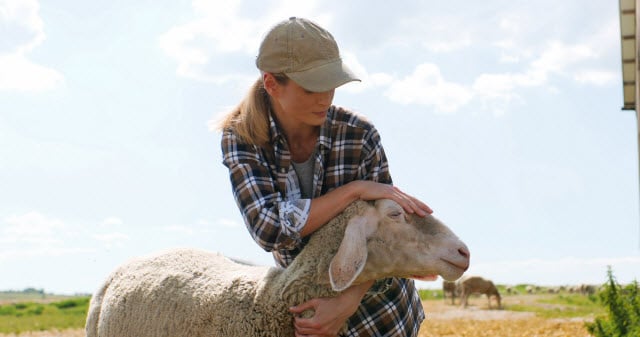
When sheep have internal parasites like worms, not only can they quickly lose weight and fail to thrive, but they will also pass these parasites to every other animal in your flock, which can result in poor production across the board, along with serious health effects for individual animals.
In addition to deworming your sheep on a regular schedule, it’s also important to use different products, as most of the sheep wormer medications sold will only kill certain varieties of internal parasites which may effect your flock, allowing others to thrive within your animals.
Most shepherds alternate medication between two brands and types of medication, so that they are consistently killing every type of internal parasite which may be afflicting their stock.
Sheep Drench vs Sheep Wormer Tubes
The best way to deworm your sheep flock is to administer oral medication. This either comes in liquid form which you can administer with a syringe or drench gun, or you can purchase disposable tubes of sheep dewormer paste.
Drench Guns
Using a drench gun, and buying sheep wormer medication in bulk is generally the cheaper choice, and it can make administering the medicine much faster (a big plus if you have a larger flock).
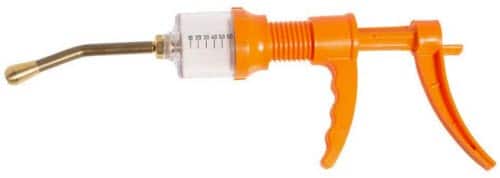
Drench guns come either as a hand-held syringe that you can use to dose each sheep properly, or you can purchase a larger sheep drench gun which will have a tube that feeds directly from your jug of dewormer. This set-up is ideal for large flocks which you run through a sheep handling system — you can set the dosage once, and every squeeze of the trigger will administer your dewormer to the next sheep in line.
Sheep Wormer Tubes
If you have a small flock, or don’t want to mess with a drench gun, then purchasing your deworming medication in tubes is the way to go.
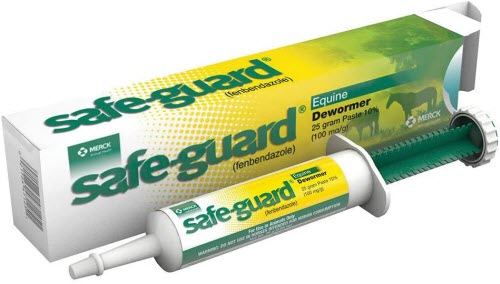
Each tube has a graduated dosage ring, so you can set it for the proper dose for each animal and administer the medication orally. These are essentially disposable drench guns. The paste (usually white) makes it pretty easy to see if all or part of the medication was ingested by the sheep as well.
When you finish with a tube, you can just toss it in the garbage. They keep well, so you can order a large batch of deworming tubes, so you always have plenty on hand.
While many of these tubes are marketed as equine products, they can be used for sheep – you just need to get the dosage correct for your sheep’s weight.
Sheep Deworming Schedule
As I mentioned earlier, an important part of deworming your flock effectively is administering more than one type of wormer medication, as most of the chemicals used in these treatments are ineffective against some worms and internal parasite strains.

I recommend working out a deworming schedule for your farm that fits into your annual flock maintenance tasks. For example, you may choose your shearing day as a date to deworm your flock and to trim hooves as you’ll be handling each sheep individually on that day anyway. Separating ewes into groups for breeding with different rams at the end of summer may be another opportune time to de-worm your flock.
Additionally, lambs are especially susceptible to internal parasites (particularly tapeworms), so a more aggressive deworming regimen should be followed to ensure that your lambs thrive.
Here are my recommendations for a sheep wormer regimen for both your lambs and adult sheep:
Deworming Lambs
Begin worming your lambs when they are about 8 weeks old, and continue monthly (or at the very least bi-monthly) until they reach a year in age.
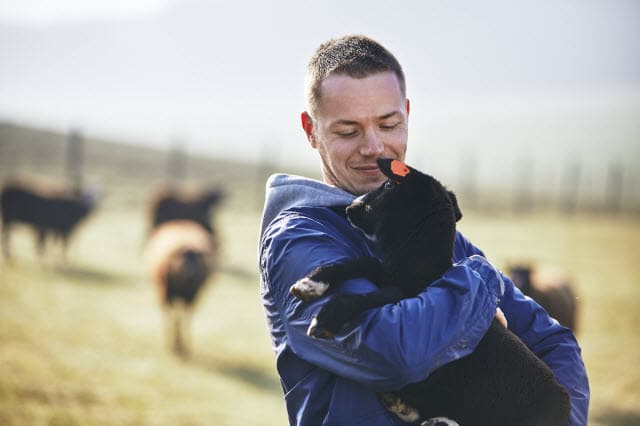
Ivomec and Cydectin are recommended for lambs, and Valbazen should be used to treat tapeworms. If you are raising lambs for market, be sure to note the meat withdrawal time for each medication (included in the chart later in this article).
Deworming Adult Sheep
Deworm your ewes 2-4 weeks before they lamb to ensure that parasites are not passed to the lambs.
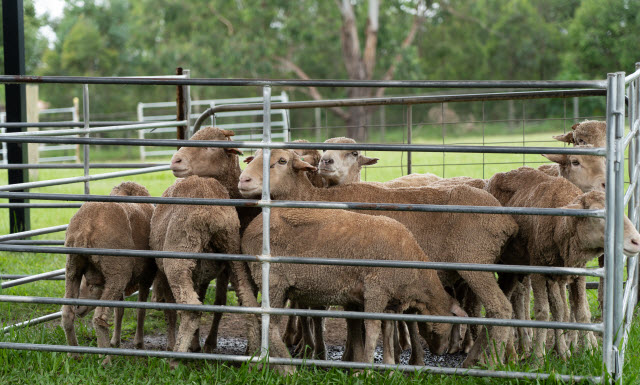
Rumatel is the only approved drug to use in lactating animals, so it’s important not to worm ewes with anything else while they are nursing. NEVER use Valbazen during the first trimester of pregnancy.
Adult sheep should be wormed 2-4 times a year, more frequently if you notice your flock is thin or if you are not using an effective rotational grazing plan.
I recommend rotating Ivomec with Safeguard or Cydectin. A once-annual treatment with Valbazen for tapeworms is also a good idea.
Worming Lambs for Roundworms and Tapeworms
It’s important to note that lambs thrive, and gain weight most rapidly when they are treated on-schedule for both roundworms and tapeworms. The chart below documents weight gain during an 8-week trial of 300 lambs.
One group of lambs was untreated, one group was treated only for roundworms, and the third group was treated for both roundworm and tapeworm infestation. As you can see, there is a clear advantage to worming your lambs, and for treating lambs for both roundworm and tapeworm load. Sheep food is expensive – make sure you’re feeding your lambs and not their worm load!

Sheep Worming Dosage Chart
Each of the sheep de-worming medications discussed in this article has a unique dosage amount which is appropriate for sheep. They also each have a different meat withdrawal time (the number of days which must pass after deworming before slaughtering the sheep for human consumption).
The short chart below gives some information which can be quickly referenced for Valbazen, SafeGuard, Ivomec, and Cydectin sheep deworming medication. Consult your individual medication directions prior to use, as the chemical concentration of your sheep wormer may vary from the standard. If you have questions be sure to call your veterinarian.
| Note: 1 ml = 1 cc | Valbazen (albendazole) | SafeGuard (fenbendazole) | Ivomec (ivermectin) | Cydectin (moxidectin) |
| Meat Withdrawal Time | 7 Days | 6 Days | 11 Days | 14 Days |
| Standard Dosage | 0.75 ml / 25 lb | 0.6 ml / 25 lb | 2.9 ml / 25 lb | 2.3 ml / 25 lb |
| 25 Pound Sheep | 0.75 ml | 0.6 ml | 2.9 ml | 2.3 ml |
| 50 Pound Sheep | 1.5 ml | 1.1 ml | 5.7 ml | 4.5 ml |
| 75 Pound Sheep | 2.3 ml | 1.7 ml | 8.5 ml | 6.8 ml |
| 100 Pound Sheep | 3.0 ml | 2.2 ml | 11.4 ml | 9.1 ml |
| 125 Pound Sheep | 3.8 ml | 2.8 ml | 14.2 ml | 11.4 ml |
| 150 Pound Sheep | 4.5 ml | 3.1 ml | 16.0 ml | 13.6 ml |
*Important Notes
- Valbazen dosage above assumes a 11.36% suspension. DO NOT use in pregnant ewes during the first trimester.
- Safe-Guard / Panacur dosage above assumes a 10% suspension. SafeGuard is not approved for use in sheep, but it is effective and many shepherds use it regularly as long as the appropriate dosage is followed. Personally, I’ve never had a problem using it, and it’s a product I prefer to use in tandem with Ivomec.
- Ivomec dosage above assumes a 0.08% suspension.
- Cydectin dosage above assumes a 1 mg/ml suspension.
Best Sheep Deworming Products and What Type of Parasites They Treat
Ivomec Sheep Drench
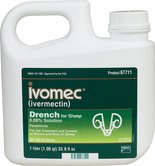
Ivomec (ivermectin) sheep drench is the preferred and primary product used to deworm sheep by most shepherds. It treats adult and fourth-stage larvae of gastrointestinal roundworms, lungworms, and all larval stages of nasal bots. It is FDA approved, and typically is sold in a 0.08% solution (refer to dosage chart above).
While it is typically cheapest to purchase this sheep worming medication as a drench to administer with a syringe or drench gun, paste tubes are also available.
*Note dosage differs from standard 0.08% – adjust your dosage appropriately and don’t simply go by weight indications on tube.
Cydectin Oral Drench for Sheep
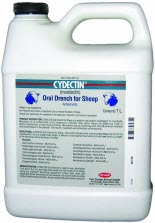
Cydectin is an excellent de-worming medication which relies on the chemical moxidectin to kill internal parasites affecting your sheep. It successfully kills the following internal parasites in both the adult and larval stage 4 forms: Haemonchus contortus, Teladorsagia circumcincta, Teladorsagia trifurcata, Trichostrongylus axei, Trichostrongylus colubriformis, Trichostrongylus vitrinus, Cooperia Curticei, Cooperia oncophora, Oesophagostomum columbianum, Oesophagostomum venulosum, Nematodirus battus, Nematodirus filicollis, Nematodirus spathiger.
While Cydectin does not treat tapeworms, it will successfully decimate roundworm load found in the stomach and intestinal tract of your sheep.
It’s very effective, similar to Ivomec, though it tends to be slightly more expensive. Lately I have not been able to find it in a 1L liquid drench, but you can buy it as either a tube of oral gel (it’s marketed for horses, but adjust the weight to that of your sheep), or a pour-on liquid that will wash out of wool within a few weeks of application. Pour-on is more economical for treatment of large flocks.
Buy 1 Tube of Oral Gel or Buy 500mL for Pour-On Treatment
SafeGuard for Sheep

While Safe-Guard (fenbendazole) is not approved for use in sheep, it is a product that many shepherds use safely. Just use the proper dosage (see above).
Safe-Guard effectively kills both small and large pinworms (strongyles) in sheep. This is why it is often incorporated in a deworming schedule to complement the protection provided by Ivomec or Cydectin.
Buy Tubes on Amazon or Compare Price at State Line Tack
Panacur for Sheep

Panacur (fenbendazole) is an alternative to Safe-Guard. It is generally the exact same deworming medication, and you can buy it in the same suspension/concentration.
It can be dosed the same way to treat large strongyles and small strongyles (pinworms) in sheep, and is generally purchased in tubes of paste.
Buy Panacur Tubes on Amazon or Compare Price at State Line Tack
Other Sheep Wormer Medications
Beyond these 4 popular sheep dewormers, Valbazen (albendazole) is a popular option for the treatment of tapeworms in sheep, and Prohibit (levamisole hydrochloride) is another popular dewormer drench which is a cost-effective way of treating roundworms in the stomach and instestinal tract of sheep. It comes as a powder which you can mix with the appropriate amount of water to make your own sheep drench, although recently I have not been able to find this product in stock anywhere.
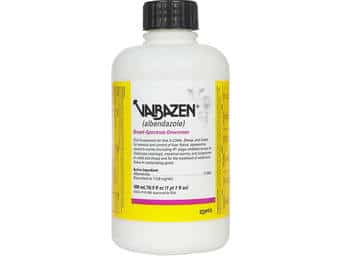
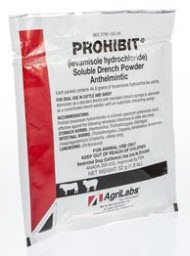
Is there a “Best Wormer for Sheep?”
There are so many different types of internal parasites which can affect your flock, that there isn’t really a one-size-fits-all treatment that will provide complete coverage.
The most important step is to educate yourself (you’ve come to the right place for that!), and to use a rotating regimen of sheep dewormer products to provide your flock with effective coverage, allowing them to grow and thrive.
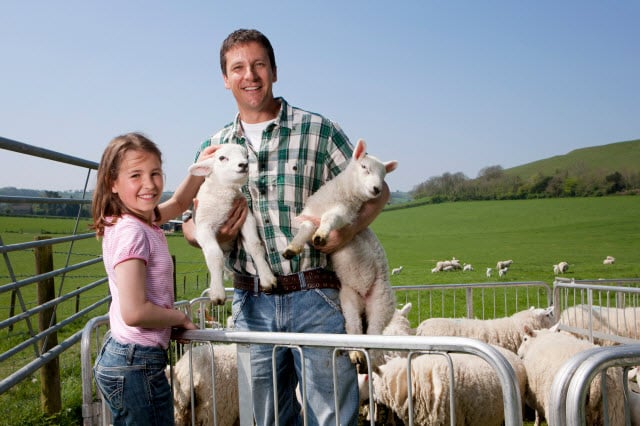
Finally, I’d like to reiterate that it’s important when worming your sheep flock to be aware of the age and management stage of each animal before administering medication.
While lambs are susceptible to worm-loads and will thrive when properly wormed, you do have to take care not to over-treat with these chemicals … follow the proper dosage and treatment schedule (outlined above) to avoid doing more harm than good.
The same goes for pregnant and lactating ewes — avoid de-worming in the first trimester of pregnancy and during lactation (deworming pregnant ewes about a month before delivery, and after weaning their lambs is the safest practice).
Thank you for reading – I hope that you’ve found this guide to be enjoyable and if it has been please consider sharing it on your blog, website, or social media channel!
If you’d like to receive helpful informative articles from time to time, please also consider signing up for our no-spam mailing list!
This article was originally published in September, 2017 but has been updated for 2022 to include the latest science and information and the best available sheep de-worming products.

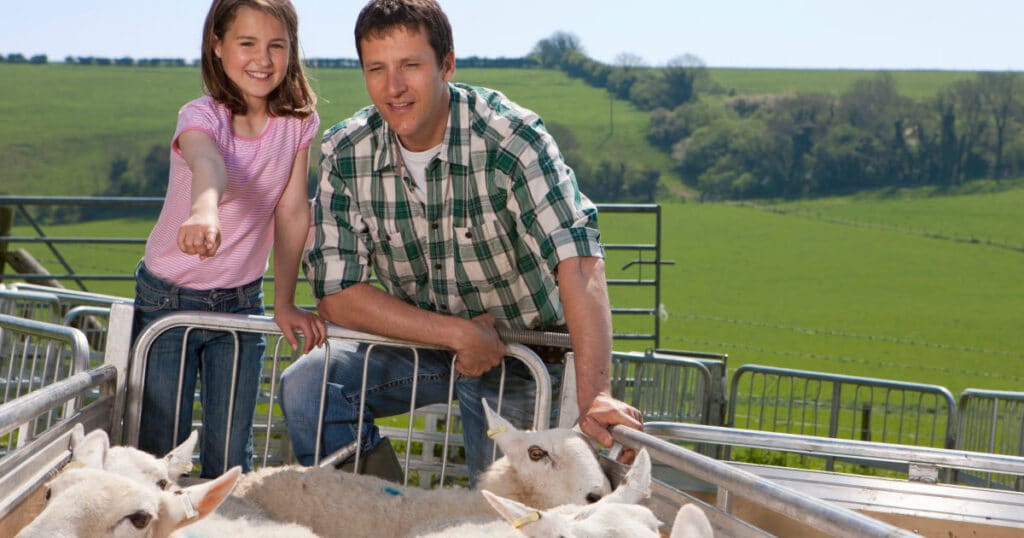
I just do not understand the ideology of those that claim it is wrong to deworm our flocks or push the use of ineffective moldalities like Apple Vinagar, garlic, diamatious earth, etc. I understand the effectiveness of rotational grazing and how it benifits the fertility of the field and pasture.
I do not understand these ppl that tell us to raise unproductive breeds like most hair breeds or they lie telling their customers that wool breeds of sheep produce lanolin which causes the meat of sheep with wool taste gamey and unpalatable.
I am a hobby farmer in south/western Missouri. Have a small flock 1 ram and 5 ewes. Now wool, Just a bunch of professional lawn mowers. I am looking forward to being a better sheep mamma through what I can learn on your blog. Thanks for the pointers.
I need all the help I can get! I’m a Newbie when it comes to sheep. I only have a young Ram right Now. He just fell in our lap. Wasn’t planned at All! Even though I have wanted to start with a few sheep, I don’t know anything about them. I’ve had goats, cows, horses and many other farm animals. But not sheep. Thank You! For the article